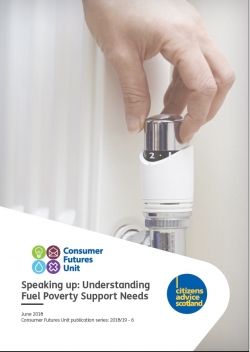
Today the Consumer Futures Unit (CFU) at Citizens Advice Scotland (CAS) is publishing its insight report 'Speaking up: Understanding Fuel Poverty Support Needs' alongside a briefing sheet.
The insight report is based on research carried out in 2017 by Ipsos Mori and Bill Sheldrick. The CFU commissioned the research to explore the characteristics of fuel poor households that may be in the greatest need of support, and the types of support that would benefit them most. The research included secondary analysis of Scottish Household Survey data as well as qualitative interviews with fuel poor households.
The research found that:
- Additional financial support for those worst affected by fuel poverty is required.
- Households that have the greatest need for support are often those who are not accessing it.
- Certain groups were more likely than others to report struggling financially or to have problems heating their homes, and were likely to express a greater need for support.
- Under the existing definition most people who are defined as fuel poor did not report financial struggles or problems heating their home, but this may result from differing perceptions around what constitutes ‘struggling financially’, or from under-heating or cutting back on other essentials.
Based on this research we make a number of recommendations:
- Increase the financial support available to those worst affected by fuel poverty, and review how this can be most effectively delivered.
- Ongoing efforts are required to increase awareness of existing discount and credit schemes among households with the greatest need of support, including reviewing the practice of suppliers in making their customers aware of schemes, and examining how third party organisations can be supported to improve signposting to support.
- Awareness of existing advice and support services should be improved, and, where necessary, better supported.
- Develop more bespoke or targeted support delivered to specific groups who have the greatest fuel poverty support need, including those reliant on electric heating, those in rural areas, those in rented accommodation, and vulnerable groups.
- In order to address the particular disadvantages faced by those in remote rural areas, any new definition of fuel poverty should include an enhanced minimum income standard for remote rural areas, to reflect higher living costs in those areas.